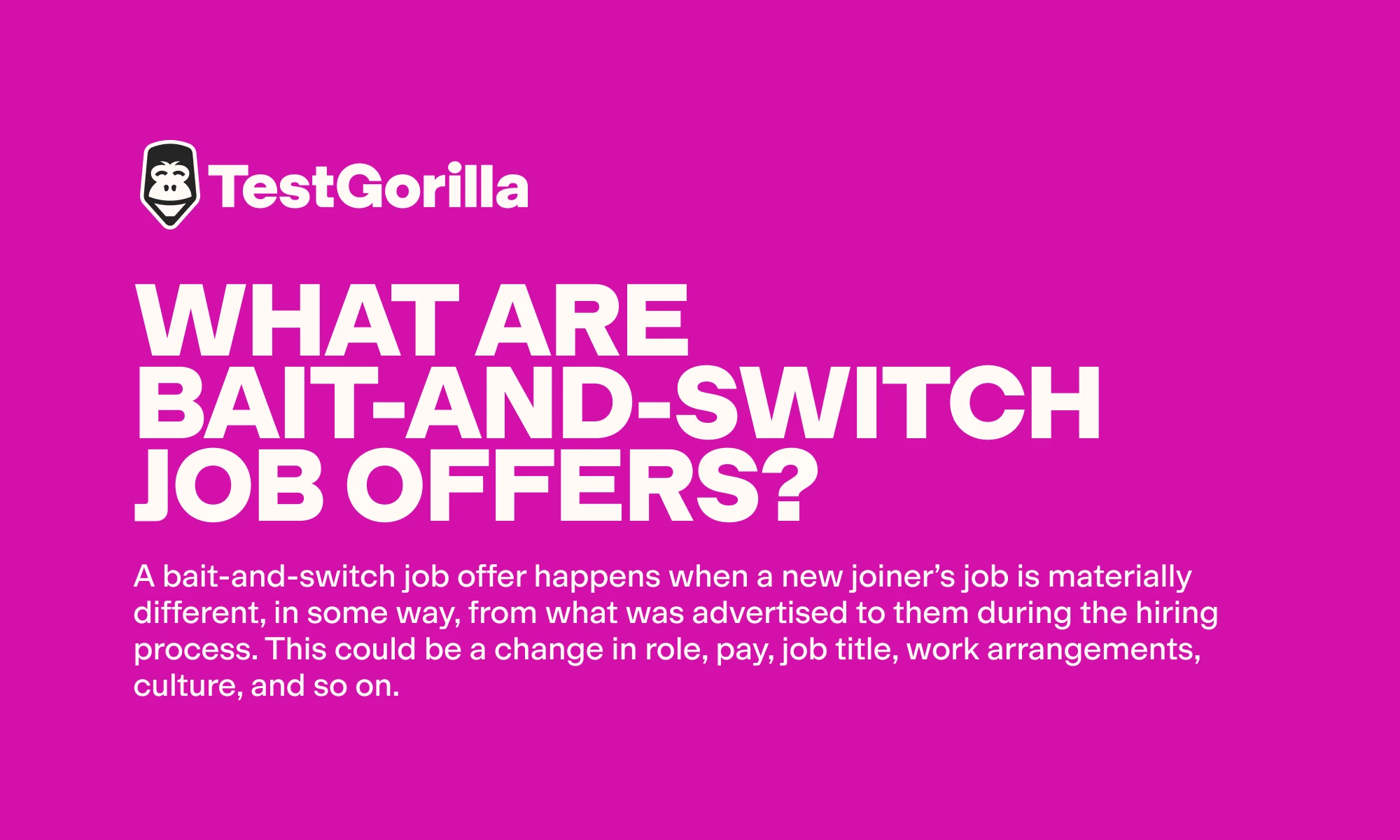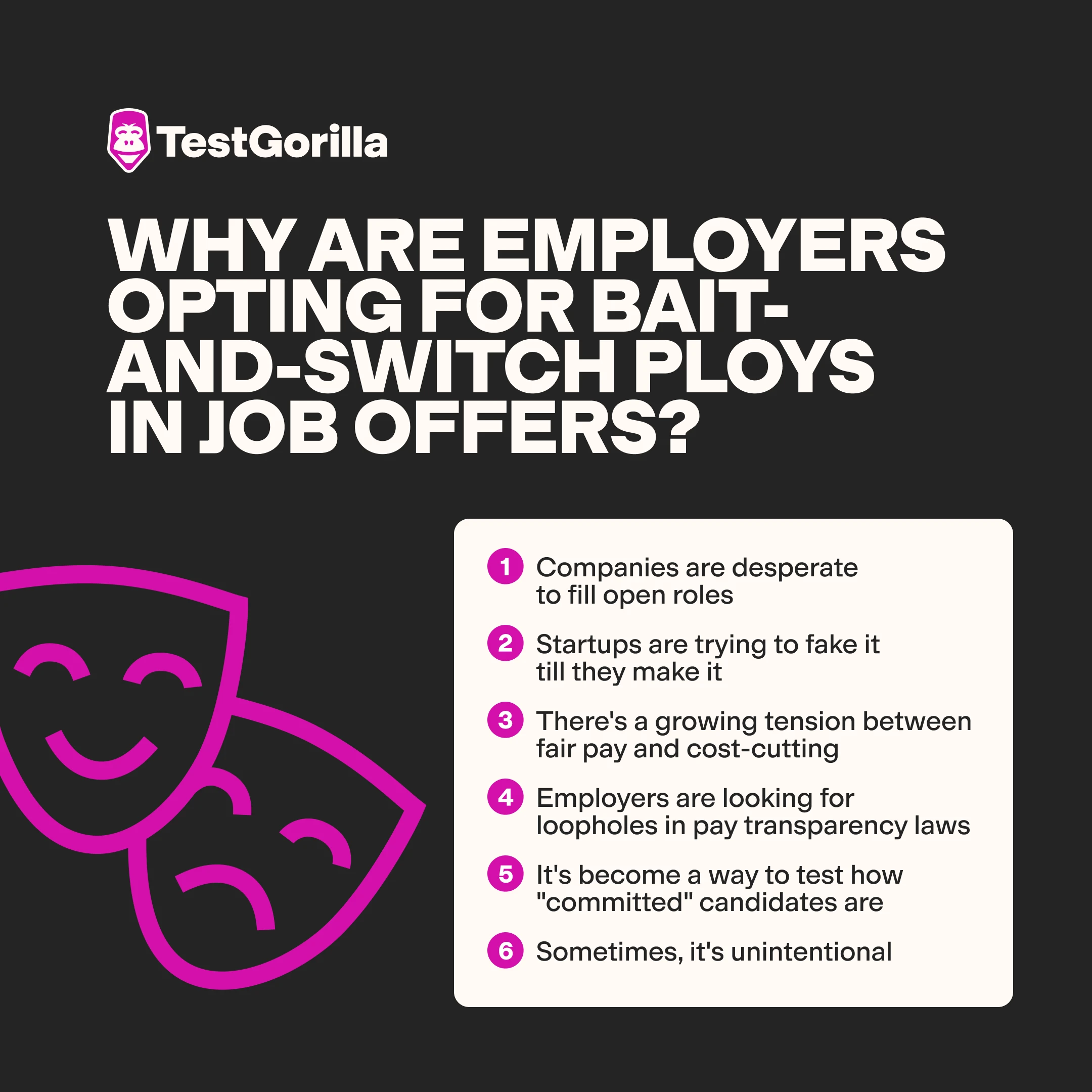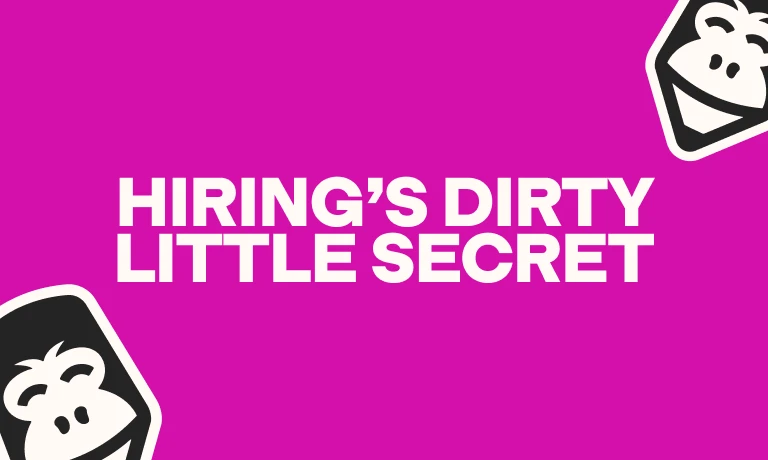It’s a tough job market – talent gaps are growing, skills needs are changing faster than ever, and candidates are pickier about who they work for. Employers are in a war for talent, and many are struggling to fill open roles.
Some companies have turned to unethical tactics to lure in job applicants, including ghost jobs and bait-and-switch job offers.
While bait-and-switch offers may seem like a clever way to get candidates through the door, they can cause serious long-term damage.
Below, I explain what bait-and-switch job offers are and how to spot them. I also look at why they're on the rise and why they're a bad idea.
What are bait-and-switch job offers?
A bait-and-switch job offer happens when a new joiner’s job is materially different, in some way, from what was advertised to them during the hiring process. This could be a change in role, pay, job title, work arrangements, culture, and so on.
The term "bait-and-switch" was originally used to describe a type of marketing fraud where customers were drawn in with the promise of a specific product or deal, only for it to be swapped with something less appealing, like a different product or price.
Unfortunately, this tactic has found its way into recruitment practices. Here are examples of what bait-and-switch job offers can look like:
A software engineer is hired to lead development on new products or features, but ends up spending all their time maintaining legacy systems.
A sales manager is promised a fixed salary of $120,000 per year during the hiring process, but ends up with an offer letter for a $90,000-per-year base salary and the rest in "performance-related bonuses."
A candidate accepts an offer for a marketing “director" position, but the final contract says marketing “manager," listing the same responsibilities as the job description but with less seniority.
An applicant accepts a hybrid role, but after joining, they’re told there’s been a "recent change in policy" and the position is now full-time from the office.
Greenhouse, a hiring platform, surveyed nearly 3,000 global employees and found that more than half (53%) faced bait-and-switch tactics where the duties advertised during the recruitment process "differed significantly" once they started their job.
But candidates aren’t the only ones blindsided by bait-and-switch strategies. Some employers are in the dark about it happening in their own companies, while others don’t recognize they’re doing it.
Bait-and-switch red flags
Let’s look at some signs that employers – or their recruitment or HR teams – are using bait-and-switch tactics. These can show you how to spot current or previous bait-and-switch job offers in your company. Candidates might use these as signs to avoid applying for certain jobs.
Type of change | Red flags |
Discrepancies in roles and responsibilities | - Overly vague job descriptions that lack specific details about the role’s scope - Old or inaccurate role descriptions that haven’t been updated before listing - Inconsistencies about the duties of a job across different parts of the hiring process – for instance, in an interview vs. the job description - When candidates are informed about "last-minute" significant changes to their roles – just after accepting the offer or starting their new role One Reddit user shared their experience: “My job is completely different than as advertised. “Talked to my management…they pretty much admitted to it being a bait and switch. Said certain things should have been added to the job description and certain things were on the job description that they knew weren't true and did not omit.” |
Changes to compensation | - When employers are unwilling to discuss a pay range or budget for the role, even if it is not the exact number. - When employers tell a candidate little to no information about how variable comp is structured or calculated - When hiring teams suddenly start questioning a candidate’s capabilities, but still want to hire them despite these "shortcomings" (they could be trying to get away with a lower comp offer) One employee recalled how in their first interview, HR told them their expected salary was "well within" the range for the job. But the final offer was 30% lower than the agreed salary. Apparently, the employer said the candidate’s "experience and market value didn’t warrant the higher salary." |
Differing job titles and ranks | - When there’s a mismatch in a candidate’s job title across different stages of the hiring process – for instance, the job listing says one thing, but the hiring manager or offer letter says something else - When smaller companies or startups claim to "not care" about ranks and titles and give employees titles they didn't want during a scale-up or when creating org charts Yashna Wahal, HR and hiring expert, discussed her experience with this from an employer perspective – "When leadership changed their mind and pushed for more 'structure,' some employees ended up with ranks lower than they expected, and one even left the company because they were so upset." |
Other changes | - When a job is advertised as more flexible during interviews than it is in the employment contract - Cases where a hiring manager’s or recruiter's description of a company’s culture, values, and working practices differ from what previous or current employers are saying in online or offline forums An employee on Reddit highlighted their experience with this kind of baiting and switching, saying their "current job has been a lie from the first interview." At the time of hiring, they were told they’d work Monday-Friday, from 8:00 am-4:30 pm. As soon as they were hired, this was changed to Thursday-Saturday, 6:00 am-2:00 pm – a significant change! "I confronted them," the employee said, “and they said that there was only one shift open at the advertised hours, and that was filled by one of the other people […] hired the day after me." |
The best insights on HR and recruitment, delivered to your inbox.
Biweekly updates. No spam. Unsubscribe any time.
What isn't a bait-and-switch job offer
Not all role changes, fluid job titles, or flexible work setups are bait-and-switch. Here are some examples.
Skills-based organizations (SBOs): Instead of established roles and rigid job titles, SBOs use a flexible model where employees are assigned tasks and projects based on their skills and strengths. The key distinguisher? Candidates are told upfront that their roles will change based on their skills and the company’s needs.
Planned mobility: Graduate rotational programs, stretch projects, and career development-related job moves are all valid when candidates are kept in the loop and know these are growth opportunities.
Necessary changes: In fast-evolving companies or bigger company transformation projects, some change in job duties is normal, as long as employers are transparent and the duties are still roughly in line with the original job.
Why do employers opt for bait-and-switch offers?
Here's why employers are opting for bait-and-switch ploys in job offers.
1. Companies are desperate to fill open roles
Let's face it – today's employers are dealing with a tight labor market, meaning there are more open positions than skilled talent to fill them.
According to the Bureau of Labor Statistics (BLS), the current US labor participation rate is 62.5%, which means 37.5% of eligible adults aren't working or actively looking for work, further limiting the pool of available workers.
What's making it worse is the speed at which the most important skills needed are changing. For example, according to the World Economic Forum's latest Future of Jobs report 2025, AI skills are, and will continue to be, in high demand for the foreseeable future. But because it's a relatively new space, AI talent is scarce.
Moreover, even traditional roles like accounting are facing shortages, with overall demand growing and interest in the profession declining, according to Deel, an HR and payroll platform.
The result? The Manpower Group's latest Global Talent Shortage survey found that 74% of employers are struggling to find the talent they need.
Employers are doing whatever it takes to secure candidates, including overselling roles, changing job descriptions at the last minute, and making promises they can't keep.
2. Startups are trying to fake it till they make it
We spoke to Yashna Wahal, who’s hired for an early-stage startup. She admitted, "I can tell you one thing, that sh*t ain’t easy."
Startups and other new companies have difficulty competing with more established employers.
They can’t offer the high salaries, fancy perks, or rock-solid job security that employees want. Further, they can’t attract candidates based on brand recognition or a strong reputation. Plus, they demand longer hours, a "wear-many-hats mentality," and a lot of hustle.
According to Johnny Nash, a Former Forbes Councils Member, "the biggest challenge startups face is recruitment.” In fact, Stanford's course "How to start a startup" emphasizes how one thing founders underestimate is how hard it is to recruit.
When you’re in this position, sugarcoating the truth is tempting. Some employers mislead candidates about work culture, make vague promises about career growth, or downplay working hours – just to get someone through the door and hope it works out.
A friend who's requested to stay anonymous recently shared her experience with a bait-and-switch offer. "I was startled to see only 20 days of annual leave on my employment contract, after the company made a big fuss about work-life balance during the hiring process," she said.
3. There's a growing tension between fair pay and cost-cutting
Economic uncertainty, a looming recession, and rising business costs mean companies are also trying to cut their labor costs.
Payscale's 2025 Compensation Best Practices Report, which gathered data from more than 3,500 participants, found that almost half the companies are experiencing increased tension between paying their employees fairly and optimizing spend.
These organizations are using strategies like reducing pay increases, lowering salary offers, and even hiring less experienced talent to save money. Employers plan to boost base wages by a median of 3.5% in 2025 – compared with 3.8% in 2024.
Unfortunately, employees are struggling with the same problems. With growing uncertainty and high inflation, people need better pay.
According to ADP's People at Work 2024 Survey, 55% of employees put pay at the top of their employment priorities, and 40% are dissatisfied with their salaries. This is unsurprising given the pressure they're facing from falling wages and the increasing cost of living.
What does all this mean? You must stay competitive in your offers if you want to snag the best talent. Since many can't afford this, they use ambiguous salary ranges, promising deferred increases, and misrepresenting variable pay to encourage applications.
4. Employers are looking for loopholes in pay transparency laws
Pay transparency laws require employers to disclose salary ranges in job postings, aiming for fair hiring practices with lower wage disparities. States like New York, California, and Colorado have already passed pay transparency laws, and this is expected to spread to more US states, becoming the norm over time.
Mercer recently reported that 75% of US employers believe job candidates now expect pay transparency, while 54% believe their current employees also expect it. Unfortunately, the report shows that only 19% of companies have a pay transparency strategy in place. Another report by Aon also shows that only 18% of companies feel they’re ready for pay transparency.
Why are employers shying away from it? Many employers are in a bind. We've already seen that rising operational costs, economic uncertainties, and competitive labor markets are making it challenging to offer top-tier salaries.
Companies want to make lower pay offers, but listing lower numbers on job postings means potentially losing talent. So they're putting numbers that both comply with pay transparency laws and attract candidates. Then, they’re finding ways to justify changing offers later on – for instance, by changing the role or level, being vague about total compensation, or questioning candidates' abilities.
5. It's become a way to test how "committed" candidates are
A handful of employers use bait-and-switch tactics to test how committed candidates are to working for them. In my experience, this is rare but not unheard of.
For example, a company might dangle an exciting role and downgrade the role once they draw candidates. Here, they’re trying to assess if this person is still passionate enough about the role or company – not just the title.
Some employers offer less money than discussed to check if a candidate is good enough in their performance. Their thinking? If a candidate is truly motivated by the job, they’ll be willing to accept less now and prove themselves before receiving an increase.
Finally, a few companies use bait-and-switch offers to test the boundaries and see what candidates are willing to be flexible with for the job – lower pay, inconvenient work hours or locations, role changes, etc. They believe that if they can make the job sound enticing enough, applicants will compromise – and sometimes, this happens.
6. Sometimes, it's unintentional
Not every bait-and-switch offer comes from shady motives. Sometimes it’s a genuine mistake, caused by evolving needs, poor communication, growing pains for startups, and more.
Here are some situations where this can happen:
Internal changes during the hiring process – for example, if the company restructures right when they’re about to onboard – might change the nature of the job or budget.
Internal miscommunication between members of the hiring team might, for instance, lead a recruiter to say a role is entirely remote when it’s hybrid.
External agencies or headhunters who misunderstand employer requirements might, for example, overpromise on culture, making a company out to be "super flexible" when it isn’t.
Loose use of job titles and duties can confuse candidates – like when small startups use titles like "lead" loosely to signify the importance/seniority of a sole contributor role.
All that said, at the end of the day, just like all the other reasons for baiting and switching, genuine mistakes can wreak havoc.
Be warned: Bait-and-switch job offers do more harm than good
Bait-and-switch hiring is a short-sighted move that can lead to long-term damage that’s difficult (and expensive) to fix.
Here’s what a bait-and-switch job offer can lead to:
A poor employer brand
If people feel tricked or misled, they’ll feel blindsided, resentful, or worse – and likely leave bad reviews for your company on Glassdoor, Reddit, LinkedIn, and other platforms, preventing other candidates from applying for positions in your company.
High turnover
The Human Capital Institute reported that up to 20% of new hires often quit their jobs in the first 45 days because the role didn’t match their expectations. When employees feel deceived, they don’t stick around, and you’re back to square one – reposting jobs, paying recruiters, and spending time retraining another person.
Low morale
Inaccurate information around jobs can also highlight poor internal communication practices or unclear company goals. This doesn’t just affect your new hires – it can also affect your existing team’s morale.
Legal risks
In some cases, if job offers are grossly misleading, candidates might have grounds for legal action, which can be costly and damage your reputation.
For example, Quest South Perth Holdings was found liable and fined over AUD 50,000 for making false or misleading representations when they outsourced two of their employees to a labor hire company without telling them and continued to treat them like their own employees, breaching the Fair Work Act's sham contracting provisions.
The better "switch" to make
There are better, non-deceptive ways to resolve some of the struggles that lead to bait-and-switch schemes in the first place.
For instance, being transparent about pay and emphasizing flexible career paths can help you attract candidates who value growth, learning, and career development over high pay.
Additionally, skill-based hiring methods can help attract the right kind of candidates and lower hiring costs. Here's how:
Focusing on skills instead of obsessing over degrees and fancy employment histories widens the talent pool, making it easier to fill roles.
Some skill tests (like motivation tests) measure candidates' passion for the job and job offer expectations, helping you see if they're a good fit for the startup world (lower pay but better growth opportunities).
Meanwhile, culture-based assessments let you find candidates who naturally vibe with your mission, values, and work environment, so you don't need to "bait."
Our latest research showed that 78% of employers reduced their cost-to-hire by using skills-based hiring.
Ditch tricks for skills to hire the best talent
With growing economic uncertainty, a tense labor market, and shifting employee priorities, employers are finding it hard to find and hire the talent they need. Many are resorting to bait-and-switch tricks – misleading candidates about the role, pay, title, or other factors during the hiring process, just to get them through the door.
Unfortunately, this tactic can be very damaging. It hurts your reputation, causes turnover, and can put you in legal hot water. Switching to skills-based hiring is a more effective and risk-free way of landing top-notch candidates.
You've scrolled this far
Why not try TestGorilla for free, and see what happens when you put skills first.




















